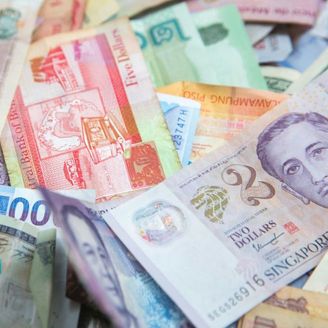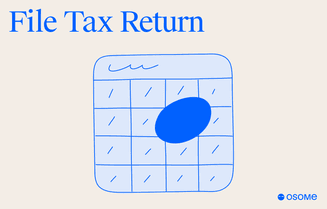Singapore Income Tax for Foreigners: Essential Rates and Tips
- Published: 14 March 2024
- 10 min read
- Tax & GST


Gabi Bellairs-Lombard
Business Writer
Gabi's passionate about creating content that inspires. Her work history lies in writing compelling website copy and content, and now specialises in product marketing copy. When writing content, Gabi's priority is ensuring that the words impact the readers. As the voice of Osome's products and features, Gabi makes complex business finance and accounting topics easy to understand for small business owners.
If you’re offshore and facing Singapore income tax for foreigners, you need to be armed with the most accurate and relevant information. This article examines tax residency status, income tax rates, and how to file your taxes in Singapore as a non-resident.
Key Takeaways
- Your tax residence status in Singapore is determined by either physical presence or employment for at least 183 days in the preceding calendar year. Meeting these requirements offers lower tax rates and eligibility for tax reliefs and DTAs on chargeable income.
- Singapore’s progressive tax system for residents ranges from 0% to 22%, while non-residents face a flat 15% tax rate on employment income or 24% on other incomes like director’s fees.
- Tax filing is due by April 15 and includes various income types and deductions, with the process streamlined through the Auto-Inclusion Scheme (AIS). Goods and Services Tax (GST) applies to businesses with a taxable turnover exceeding S$1 million.
Determining Your Tax Residency in Singapore
Singapore’s tax system is built around the concept of tax residency. If you reside in Singapore or have been physically present or employed there for at least 183 days, you qualify as a tax resident. The calendar year preceding the Year of Assessment (YA) determines an individual's tax residency status and whether they meet this criterion. This means that your tax residence status is not solely based on your citizenship but is more closely tied to your presence or employment in Singapore. Singapore citizens and Singapore permanent residents are both considered tax residents.
Interestingly, even a part-day in Singapore is counted as a full day for tax residence standing purposes, except when you’re merely transiting without immigration clearance. The tax rules also take into account continuous employment that spans two calendar years. Non-resident individuals who have worked in Singapore for a continuous period crossing two calendar years and have stayed for at least 183 days in total are considered tax residents for both years.
If you're a foreigner looking to establish a presence in Singapore, we offer comprehensive foreign company incorporation services to help you navigate the setup process seamlessly, ensuring your business complies with all local regulations and requirements.

Being a tax resident in Singapore has its perks. Apart from lower tax rates, tax residents are eligible for tax reliefs. They can also benefit from Double Taxation Agreements (DTAs) that Singapore has with other countries, provided they can produce a Certificate of Residence as proof of their tax jurisdiction.
Understanding the Progressive Resident Tax Rates
Singapore’s tax system is progressive, meaning the more you earn, the higher the percentage of your income you’ll pay in Singapore income tax. This system ensures tax fairness, with the tax burden distributed according to taxpayers’ ability to pay. The personal income tax rate ranges from 0% to 22% for tax residents. To better understand the tax rates in Singapore, here’s a breakdown of the rates:
- 0%
- 2%
- 4.5%
- 6.5%
- 9%
- 11.5%
- 15%
- 18%
- 19%
- 20.5%
- 22%
The progressive tax system works through tax brackets. For instance, after the first S$40,000 of chargeable income, the next 40,000 SGD is taxed at 7%. The subsequent S$40,000 of chargeable income is taxed at 11.5%. To give you a clearer picture, if your chargeable income is S$80,000, the gross tax payable would be S$2,800 on the second S$40,000 and S$4,600 on the next 40,000.
Additionally, special transitional contribution rates apply to non-resident individuals who become Singapore permanent residents.
An Overview of Non-Resident Individual Tax Rates
If you don’t meet the criteria to qualify as a tax resident, you’ll be classified as a non-resident for tax purposes. Non-residents' chargeable income is taxed differently from residents'. An individual’s tax classification determines whether they are subject to a flat rate of 15% on taxable income from employment, or they can opt for the progressive resident tax rates if those are higher.
Different types of income are taxed at different individual income tax rates for those not residing in Singapore. For instance, director’s fees, consultation fees, and other taxable income types are taxed at 24%. Starting in the Year of Assessment 2024, the income tax rate for non-resident individuals, with the exception of employment income and specific income with reduced rates, will be raised from 22% to 24%. This change will impact non-resident individuals’ tax obligations.
Unlike tax residents, foreign employees are taxed only on income earned within Singapore and cannot claim personal reliefs.
Can Employment Income Be Taxed?
Regarding Singapore employment income, the income tax rates system goes beyond the basic salary. It includes:
- Bonuses
- Commissions
- Other forms of remuneration linked to job duties
- Non-monetary benefits like employer-provided housing
This applies to both tax residents and foreigners, including those earning income remotely from Singapore or who have overseas employment.
Certain deductions can be made from taxable income from employment. These include employment expenses that the employer does not reimburse and personal deductions such as charitable contributions, subject to specific eligibility conditions. If your employer participates in the Auto-Inclusion Scheme (AIS), your salary information will be automatically reported, simplifying the tax filing process.
Filing Your Income Tax Return: A Step-by-Step Guide
The process of filing your income tax return in Singapore is straightforward. The deadline for both paper tax returns and e-filing is April 15. You need to gather a few key documents to file an income tax declaration. These include:
- Singpass/SFA
- Form IR8A for non-Auto-Inclusion Scheme participants
- Particulars of dependents for new relief claims
- Details of rental and other income
- Business registration or partnership tax reference numbers (if you’re self-employed)

Taxpayers can e-file according to their applicable income tax rates via the myTax Portal using Singpass or SFA. It’s important to not leave sessions idle for over 20 minutes to avoid timeout. If you’ve e-filed and need to make changes, you can re-file once within 7 days of your previous submission or before April 18, whichever is earlier. For any further amendments, you’ll need to contact the Inland Revenue Authority of Singapore (IRAS) via email.
For paper filing, you’ll receive the relevant tax form between February and March. If you don’t receive it by March 15, you should contact IRAS to request one. The signed first page of the paper Income Tax Return should be sent to IRAS in the provided return envelope by April 15.
The Goods and Services Tax (GST) in Singapore
In addition to adhering to income tax rates, you’ll also need to be aware of the Goods and Services Tax (GST) if you’re running a business in Singapore. GST is a broad-based value-added tax levied on imports of goods, as well as nearly all supplies of goods and services. The current GST rate is 7%, but it’s set to increase to 8% in 2023 and 9% starting from 2024.
Businesses must register for GST if their annual taxable turnover exceeds S$1 million or is expected to in the next 12 months. Voluntary GST registration is also available for businesses below this threshold but has certain conditions. Businesses that fail to register for GST when required can face penalties, including fines and the payment of GST on past transactions.
What Tax Incentives Are There for Foreigners in Singapore?
Singapore offers a range of tax incentives to attract and retain foreign talent, including Singapore permanent resident individuals. As a tax resident, you have access to various tax relief options designed to reduce your overall personal income tax burden. These reliefs include options such as:
- CPF cash top-up relief
- Voluntary contributions to CPF Medisave
- Rebates like the parenthood tax rebate for Singaporean children
- Personal tax rebate capped at S$200
There are also tax incentives specifically designed for education and retirement planning. Some of these incentives include:
- Course Fees Relief, which is aimed at boosting employability and is capped at S$5,500 annually
- Supplementary Retirement Scheme (SRS), which allows contributions to private retirement funds
- Non-Singapore SRS account holders facing a withholding tax of 24% from YA 2024
These incentives can help individuals save money and plan for their future education and retirement needs.
Managing Overseas Income and Double Taxation
Singapore’s approach to overseas income and double taxation is part of what makes its tax system attractive. Generally, foreign-sourced income received in Singapore by tax residents is tax-exempt, except for income received through partnerships in Singapore. There are, however, certain conditions under which income from overseas employment may be taxable.
To prevent taxpayers from being taxed twice on the same income—once in the foreign country where the income is earned and again in Singapore—Singapore provides relief from double taxation. This is done through tax credits, exemptions, or reduced rates, depending on whether a Double Taxation Agreement (DTA) exists and the type of income. DTAs also help prevent international tax evasion and define tax jurisdictions for cross-border transactions.
What Are the Penalties for Tax Evasion?
Tax evasion is a serious crime in Singapore and is met with severe penalties. These include fines and imprisonment. The Inland Revenue Authority of Singapore (IRAS) has the authority to conduct lengthy investigations into various tax types and can even make surprise visits to gather evidence.
Offenders may face penalties up to four times the undercharged tax amount, fines, and imprisonment of up to seven years. In some cases, offenders have faced significant fines and jail terms. The legal framework has also been amended to make tax offences registrable crimes and to enhance the sentencing framework with stiffer imprisonment sentences.
Are Capital Gains Taxable?
In many countries, capital gains—or profits from the sale of property or investments—are subject to tax. In Singapore, the capital gains from property sales are typically not subject to taxation. This can be advantageous for individuals and investors in the real estate market. That being said, if a property is bought and sold with a profit-seeking motive or if there’s a high frequency of such transactions, the gains may be considered taxable. Factors such as the holding period of the property and an individual’s financial means to hold it long term also come into play when determining the taxability of gains from property sales.
If the gains from the sale of property are taxable, they should be declared under ‘Other Income’ in the Income Tax Declaration form. Similarly, gains from the sale of shares or other financial instruments are generally not taxable as they are usually considered personal investments. The same applies to profits or losses from the buying and selling of digital tokens.
What Is Business Income Tax?
If you’re self-employed in Singapore, your income is subject to business income tax. Self-employment refers to earning income by operating a trade, business, profession, or vocation, which typically includes sole proprietors and partners registered with the Accounting and Corporate Regulatory Authority (ACRA).
Your income must be reported as business income, not as salary, and is taxed in the year following the income-earning year. You must also choose a specific accounting period, typically a 12-month period, to calculate your profits or losses for tax purposes. Depending on your revenue, you’ll either prepare a 2-line statement for revenue of S$200,000 or less or a 4-line statement for revenue above S$200,000 starting from Year of Assessment 2021.
Allowable business expenses can be claimed to reduce your taxable income. These expenses must be incurred in the course of running your business and must be related to generating income of the company. You can also claim specific expenses, such as depreciation of fixed assets as capital allowances.
It’s important to maintain proper and complete source documents for all business transactions for at least five years to substantiate claims for allowable business expenses. Failing to do so can result in penalties, including fines and imprisonment.
Summary
Understanding Singapore’s income tax system is crucial for anyone residing or planning to live there. From determining your tax residency status to understanding the progressive resident income tax rates, non-resident individual tax rates, and the taxable nature of different types of income, it’s important to be well-informed. The process of filing your tax return, GST, tax incentives for foreigners, and the handling of overseas income and double taxation are other key aspects to consider.
Whether you’re self-employed or working for a company, being aware of the tax implications of your income, the potential for tax incentives and the consequences of tax evasion is essential. With this comprehensive guide, you’re now equipped with the knowledge you need to navigate Singapore’s tax system effectively and efficiently. We also have an onshore team of experts ready to guide you when you need them — they know tax like the back of their hands and have helped many foreign businesses navigate the tax rates in Singapore smoothly! Get in touch for a consultation to find out more.
FAQ
When do I pay tax in Singapore?
You should pay tax in Singapore by April 15 of each year based on the income from the preceding year.
How much income tax do I pay in Singapore?
The income tax you pay depends on the tax rates in Singapore for tax residents, which are defined annually.
What is the income tax rate for foreigners in Singapore in 2024?
The income tax rates for foreigners in Singapore is a flat rate of 22% (24% from the year 2024). Non-residents are also subject to a 15% income tax rate for employment or the graduated resident rates with personal reliefs.
Do foreigners in Singapore pay income tax?
Yes, foreigners in Singapore pay tax according to the outlined income tax rate, and the amount depends on their fiscal base or tax residence, with specific cut-off periods determining the tax liability. Non-residents are taxed on all income earned in Singapore and can claim deductions on expenses and donations to save tax. For expat non-residents who earn income through other means, such as rental properties income and directors' fees, they are charged an income tax rate of 22%.
How is tax residency determined in Singapore?
Tax residence status in Singapore is determined by physical presence or Singapore employment for at least 183 days in a calendar year. This is the primary factor the authorities use to establish the tax residence status.
Get expert tips and business insights
By clicking, you agree to our Terms & Conditions, Privacy and Data Protection PolicyWe’re using cookies! What does it mean?






